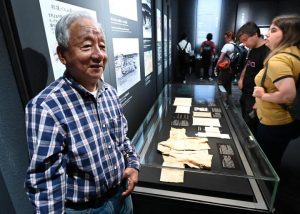With G7 Hiroshima Summit to begin tomorrow, A-bomb survivor born in Hawaii wants leaders to understand horror of nuclear weapons
May 18, 2023
Emphasizes damage caused by radiation
by Michiko Tanaka, Staff Writer
“I am patriotic to both Japan and the United States,” said Satoru Arai, 88, an A-bomb survivor who lives in Hiroshima’s Minami Ward. Mr. Arai is a third-generation Japanese-American who was born in Hawaii and moved to Hiroshima before the outbreak of the war between Japan and the United States. He received burns on his face and body from the atomic bomb dropped by the U.S. military on the city. Once again, a U.S. president is visiting the A-bombed city, this time for the summit meeting of the G7 (Group of Seven industrialized nations), slated to begin on May 19. Mr. Arai will watch the proceedings with one thought in mind. “I want the leaders of every country to learn the true terror associated with nuclear weapons and work for their elimination.”
A small, white American-made shirt is displayed at the Hiroshima Peace Memorial Museum (in the city’s Naka Ward) in a section about overseas A-bomb victims and survivors. The letters of a name written in ink on a name tag sewn onto the chest of the shirt were burned away by the thermal rays generated in the atomic bombing. Mr. Arai, a member of the Hiroshima Peace Volunteers group, shows the shirt to visitors when he guides them through the museum. “That was the shirt I was wearing on the day of the atomic bombing,” he explains.
Mr. Arai, whose middle name is Earnest, came to Japan with his parents and older sister when he was four years old. Six family members, including his grandmother and a younger brother who was born later, were living in the area of Deshio-cho (now part of Hiroshima’s Minami Ward) at the time of the bombing.
He was in fifth grade at Oko National School (present-day Oko Elementary School). He was on a street with his grandmother at a location about 1.7 kilometers southeast of the hypocenter, and as they were collecting scrap wood from demolished houses to use as firewood, they were blown over by the bomb’s blast. Mr. Arai said, “I thought I was in hell,” after he had regained consciousness.
In the darkness after the bombing, he heard people running desperately in an attempt to flee the area and became separated from his grandmother. When he managed to make it back home, his mother cried out, “What happened to you?” The left side of his face, neck, arms, and right leg were badly burned without him even realizing it. Soon, however, an intense pain arose from his wounds. His entire family survived the bombing, but his grandmother was also severely injured, and he had to bear pain day after day. His mother, seven months pregnant at the time, later gave birth to a stillborn boy.
After the war, his father returned to the United States to look for work. Mr. Arai followed him when he turned 21. He saved money working as a gardener and opened an auto repair shop in the suburbs of Los Angeles. He raised two children. “The United States is a meritocracy that rewards you if you work hard. The country made me grow as a person,” he said.
However, he also experienced great hardship. Not everyone was sympathetic upon seeing his keloid scars. Some would bring up Japan’s attack on Pearl Harbor, challenging him. “Which country do you think started the war?” Mr. Arai would explain how a large number of civilians had fallen victim to the atomic bombing, and even unborn babies were killed. “But they never seemed to understand the horror of nuclear weapons.” In the 1970s, as chair of a group of A-bomb survivors living in the United States, he called on the United States government to provide relief to A-bomb survivors. However, that country’s congressional lawmakers rejected the group’s request based on the reasoning that there was no need to care for the survivors because they had been “the enemy.”
“It is meaningless for people to argue with each other over the mistakes made by their countries,” lamented Mr. Arai. He returned to Hiroshima to live out his life and became a member of the Hiroshima Peace Volunteers in 2007 to communicate to the public about his experience in the atomic bombing.
Mr. Arai hopes that U.S. President Joe Biden and other G7 leaders will learn specifically about the damage from the A-bombing’s radiation. His mother became frail in health after the bombing and died at the age of 61. He worries about the effects of radiation on his own children. “Radiation has long-lasting effects on many people, including the offspring,” he said. “I want the G7 leaders to keep in mind the devastating consequences of the atomic bombing and work toward the abolition of nuclear weapons. No country should ever push the nuclear button.”
(Originally published on May 18, 2023)







